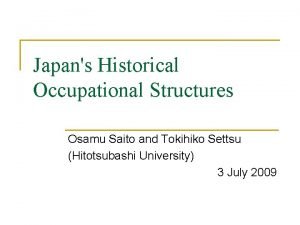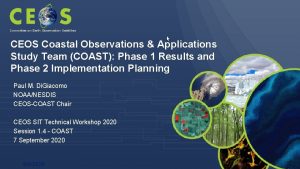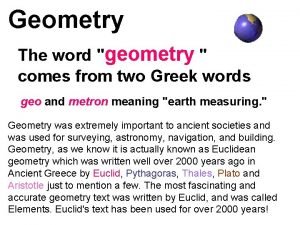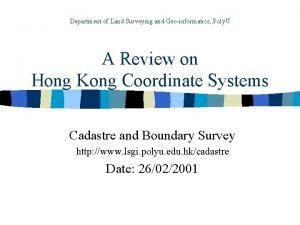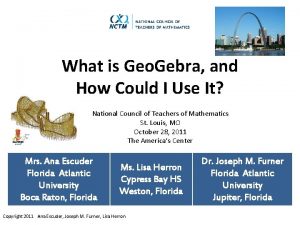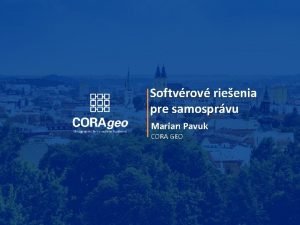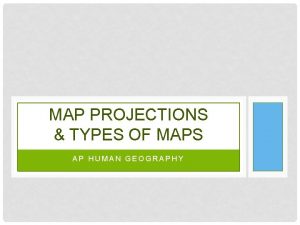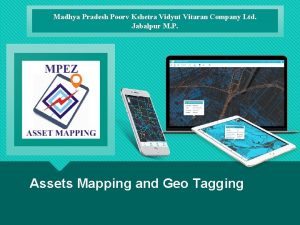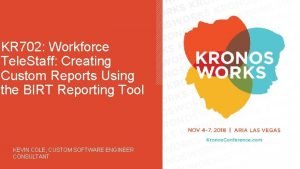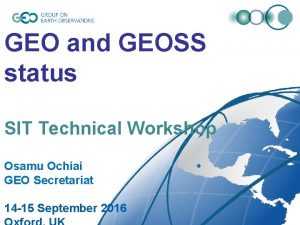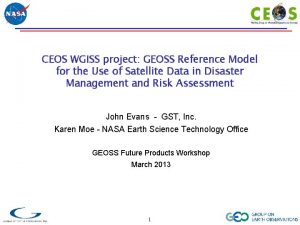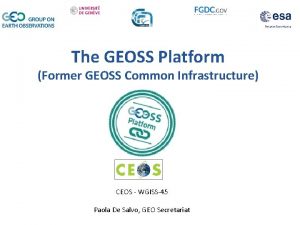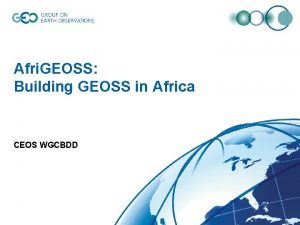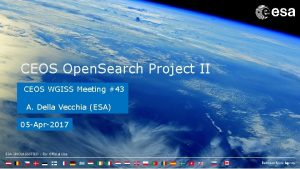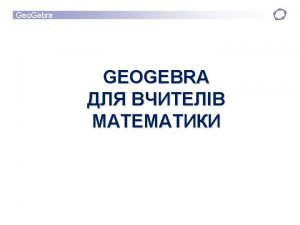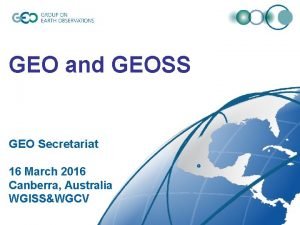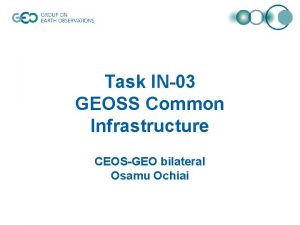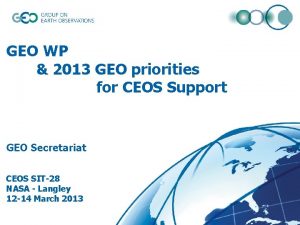GEO and GEOSS 42 nd CEOS WGISS Osamu













- Slides: 13

GEO and GEOSS 42 nd CEOS WGISS Osamu Ochiai Paola De Salvo GEO Secretariat 19 September 2016 Frascati, Italy

Unique Time in GEO’s History • Transition to next decade 2016 -2025 • Recognition of GEO’s convening power – Members, POs, Development Banks, Foundations, emerging Commercial Sector • Evolution & Recognition of Policy Mandates • New Strategic Plan with new programmatic mechanisms – community activities, foundational tasks, initiatives and flagships

Governance • GEO Plenary – 103 Member Countries, 103 Participating Organizations, 12 Observers • GEO Executive Committee – – – Africa: Egypt, Senegal, South Africa Americas: Colombia, Mexico, United States CIS: Armenia, Russia Asia/Oceania: Australia, China, Japan, Korea Europe: EC, Finland, France, Germany Observers from Program Board: CEOS, GOOS, WMO • GEO Programme Board – Oversees the establishment of the multi-year GEO Work Programmes – 42 members from GEO Members and Participating Organizations • GEO Secretariat

Four Types of GEO Implementation mechanisms

Foundational Tasks – Current List GD GD-01 GD-02 GD-03 GD-04 GD-05 GD-06 GD-07 GD-08 GD-09 GD-10 GD-11 CD CD-01 CD-02 CD-03 SO SO-01 SO-02 SO-03 SO-04 GEOSS Development and GCI Operations Advancing GEOSS Data Sharing principles GCI Operations (including access to Knowledge) Global Observing and Information Systems (new) (includes systems like WIGOS. GCOS; …. And reference datasets) GEONETCast Development and Operations GEOSS satellite Earth Observation Resources (includes advocacy for continuity) GEOSS in situ Earth Observation Resources (includes inclusion of citizens’ observatories) (includes advocacy for continuity) GCI Development (includes development of Data Management guidelines) SBAs processes: Systematic determination of user needs / observational gaps Knowledge Base development Radio-frequency protection Utilization of Communication Networks Community Development Capacity Building coordination Reinforcing engagement at national and regional level Assess the benefits from EOs and of their socio-economic value Secretariat Operations Management and Support Communication and Engagement Monitoring and Evaluation Resources Mobilization

Foundational Task prioritization by GEO Program Board • GCI Operation (GD 02) will remain the Foundational Task. – Perform GCI Components operations (GEOSS Portal, GEO DAB, Registries) – Maintain partnership with Data and Service Providers and improve these Providers discoverable and accessible – Connect new providers which are relevant to Flagships and key members and participating organizations – Collect requirements and feedback from User Communities and Stakeholders • GCI Development (GD 07) will likely be moved to an Initiative. – Develop a GEOSS Architecture based on documented and emerging user requirements – Develop and test new GCI functionalities, solutions, and components – Develop a process to implement the Data Management Principles Guidelines for providers – Promote the advancement of GEOSS interoperability through the Standards and Interoperability Forum (SIF) – Develop the Community Portal Recommendations

GEOSS Implementation requires: Data Sharing Principles • Full and Open Exchange of Data • Data and Products at Minimum Time delay and Minimum Cost • Free of Charge or Cost of Reproduction

Data Management Principles Strategy The value of Earth observations are maximized through data life-cycle management based on ten Principles supporting five themes. DISCOVERABILITY DMP-1: Data and metadata will be discoverable ACCESSIBILITY DMP-2: Data will be accessible via online services USABILITY DMP-3: Encoding DMP-5: Traceability DMP-4: Documentation DMP-6: Quality PRESERVATION DMP-7: Preservation DMP-8: Verification CURATION DMP 9: Review and reprocessing DMP 10: Persistent and resolvable identifiers

Climate/Weather Biodiversity Disasters GEOSS Portal Environment Health Ocean Discovery and Access Broker (DAB) Satellites Water Australia Regional & National Providers GEO Website Geology/Soil Energy International Providers Cryosphere Brazil Germany Russia Japan South Africa Canada Italy Spain Chile China New Zealand Switzerland Franc e Norway USA Private sector providers … … more than 100 public providers…

Examples of potential issues • Data accessibility is among the main issue mainly in the FEDEO catalog (vary from provider to provider) • Need of better metadata (lack of contacts – lack of keywords, do not enable good discoverability and usability of the data)

Proposal to work further • CEOS WGISS to identify a Po. C to discuss further for improving CEOS agencies assets discoverable and accessible through IDN, CWIC and Fed. EO • The GEO Sec, GEOSS Portal and DAB team Po. Cs are following: – GEO Secretariat • Paola De Salvo, pdesalvo@geosec. org • Osamu Ochiai, oochiai@geosec. org – GEOSS Portal • Joost Van Bemmelen, Joost. van. Bemmelen@esa. int • Guido Colangeri, g. colangeli@rheagroup. com – DAB team • Stefano Nativi, stefano. nativi@cnr. it • Mattia Santoro, mattia. santoro@cnr. it

Data Provides Side event in the GEO-XIII Plenary • November 7 th 2016 • GEO-XIII Plenary venue, St. Petersburg, Russia • Objectives – Establishing a two-ways dialogue with data providers to improve the discoverability, accessibility and usability of GEOSS resources. – Data providers already contributing to GEOSS and new data providers, flagships and initiatives and users are invited and encouraged to participate to ensure that the key objectives of the workshop are met. – Help the GEO community define priorities and shape the agenda of a more comprehensive event to be held in early 2017. • Draft agenda – – Implementing the GEO Data Management Principles Options and procedures for certification of data providers Process for new data providers to engage with GEO Discussion and way forward

GEO-XIII Plenary 9 -10 November 2016 St. Petersburg, Russia Thank you
